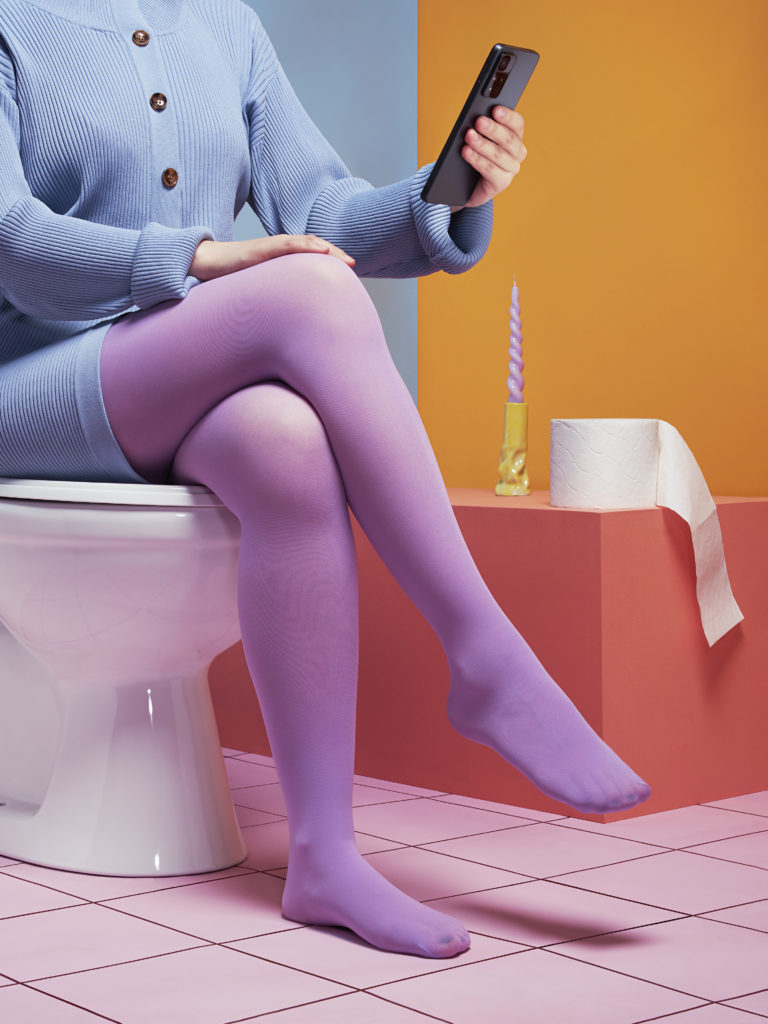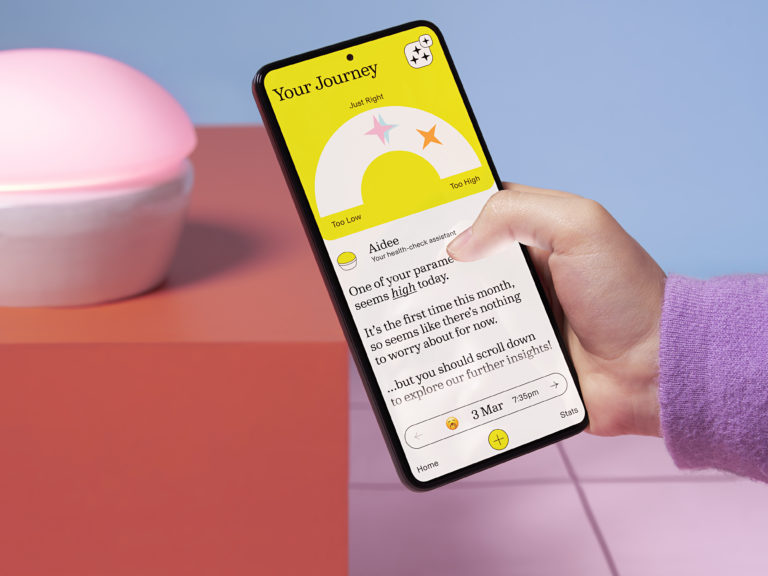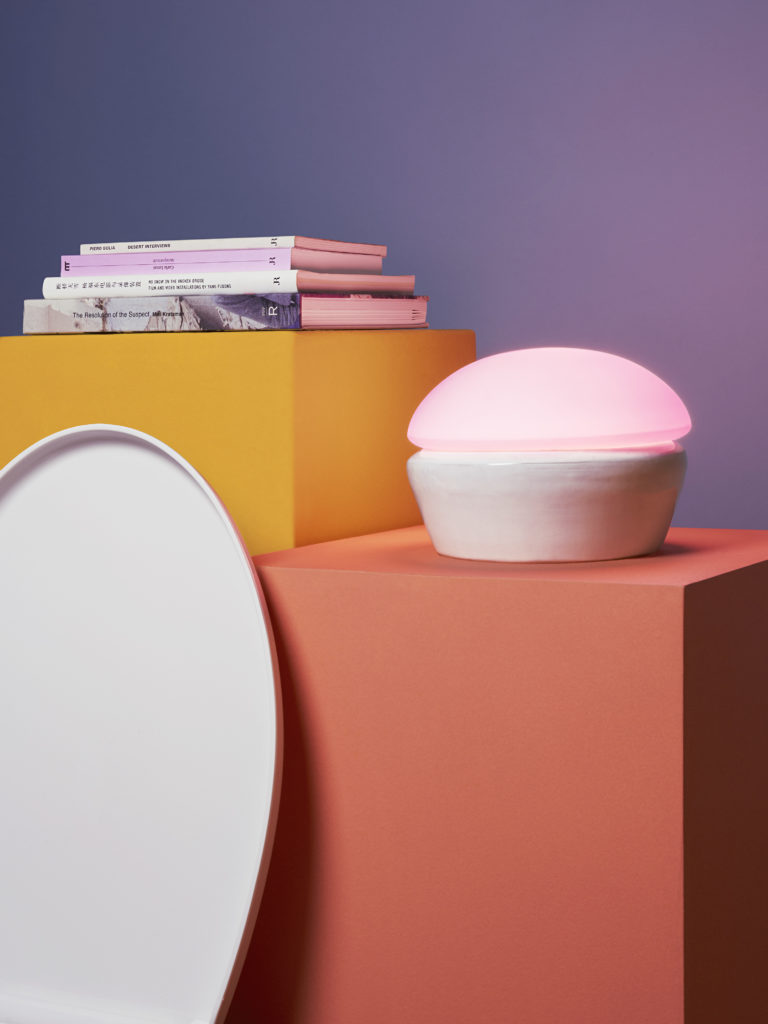Aidee
How can a qualitative expression of self-tracking data foster strong emotional and cognitive engagement?
Tracking our health based on physical indicators, such as heart rate, is now easy. But access to biochemical indicators remains more complex. Especially since we have a delicate relationship with our intimate fluids like urine. How can we make this experience positive and understandable on a daily basis? Research carried out by the EPFL+ECAL Lab shows the key role which design plays in appropriating new perspectives for our well-being.
With a “qualified-self” approach, this project aims to understand how alternative expressions of data could make more meaningful experiences around personal well-being. To do so, the EPFL+ECAL Lab has designed a system to present data collected from an at-home urinalysis device. Aidee, the resulting mobile app and supporting ambient companion device, offers novel prospects on how we interact with our intimate well-being.
Self-tracking technologies play a significant role in influencing and shaping people’s actions and behaviours. When they track biometric data, they have the potential to greatly enhance the quality of life and well-being of the people using them. However, these technologies are often abandoned by their users as they fail to create engaging and meaningful experiences.
Our technical partners, CSEM and ESTEE, focused on the engineering and microfluidics of an automatic home urinalysis device. Although this non-invasive approach can reveal valuable insights on health and well-being, the subject remains sensitive to address. Therefore, the EPFL+ECAL Lab set out to find ways of making such an experience accessible, respectful and meaningful.
The embodiment of personal data through a physical object can provide users with feelings of support and companionship
The initial idea was inspired by the work carried out to preserve the health of astronauts on missions to Mars. The assessment of their physiological state is based on complete monitoring, involving not only external sensors, but also biochemical measurements on a bodily fluid. And unlike blood, which requires invasive sampling, urine is readily available. However, the relationship we have with our bodily fluids is often difficult.
Two years of observation and creation allowed us to explore approaches able to give the data an expressive quality, but also a more tangible dimension. The EPFL+ECAL Lab has designed Aidee, a prototype system that assists people in performing home urinalysis through the qualitative expression of data and ambient physicalization. The system comprises a mobile app and an interactive device called the Aidee Light.
Representing the notion of balance, the app features a non-numerical scale, ranging from “too low” to “too high” passing through a section of “just right”. The three biomarkers can be seen together even though they don’t share a common measuring unit. By pressing the corresponding star, the user can see a page dedicated to the single biomarker. Here, the precise numerical value is present, as well as a textual report, written in a narrative style, that gives trends over time and informative explanations on the biomarker, what it influences and suggestions on how to keep it in the normal range. The user can also communicate their emotional state while taking urine measurements to create correlations between the results and body sensations.
The Aidee Light supports the app by presenting urine analysis results through the use of ambient lights and sounds. The concept and design of Aidee is grounded in the theory about situated visualisation, data physicalization, calm technology and peripheral interaction. As a neutral object, designed to look like a classic ceramic lamp, the Aidee Light provides a subtle yet reassuring presence that communicates with the user in a non-invasive manner.
The tests, carried out with 81 users, show the benefit of a visualization which serves to transform the technical dimension of values into an expression of well-being. The results indicate that these more advanced aesthetics do not reduce users’ ability to understand. The presence of the companion object also offers a positive impact by providing greater ease in relation to intimate data directly linked to our health.
Supported by the national Innovation Agency InnoSuisse and led in collaboration with the Swiss company Estee (Earth Space Technical Ecosystem Enterprises), this project opens major prospects for developing a better relationship with the parameters that promote our health and well-being.
This project has been published in the scientific journal PLOS Digital Health, presented as a paper at the 2024 Design Research Society Conference in Boston and shown as an academic poster at the Symposium in Point‑of‑Care Diagnostics in Sion.
Direction
Project Management & Engineering Lead
Research Assistant
Design and academic Lead
Product Design
UX Lead
UX Assistant
Annelaure Blanc
Phototography Credits
EPFL+ECAL Lab / Calypso Mahieu




